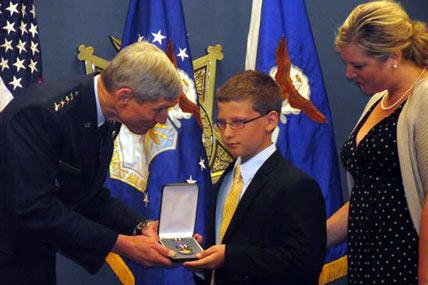Francis Gary Powers, the Air Force pilot captured by the Russians when his U-2 spy plane was shot down over the Soviet Union in 1960, was posthumously awarded the Silver Star Friday at the Pentagon.
Air Force Chief of Staff Gen. Norton Schwartz presented the medal to Powers' grandson, Trey, who was there with his father, Francis Gary Powers Jr., and other family members.
"[A]s a family, for my sister, myself, my wife, my son, my aunts and uncles and my cousins, the Powers family is deeply grateful and deeply appreciative for the awarding of the Silver Star to my father," Powers Jr. said after accepting the medal. "It goes to show it is never too late to set the record straight."
Powers died in a helicopter crash in 1977, while working as a pilot for NBC.
His capture in 1960 was one of the significant events of the Cold War between the U.S. and Soviet Union. Powers had been an Air Force pilot until 1956, when he separated to join the CIA's U-2 reconnaissance program.
The Soviets held him for more than a year and a half before trading him to the U.S. for a Soviet spy. Powers was seen by many in the U.S. as an embarrassment at the very least and perhaps even a traitor. Though a Senate Armed Services Committee review in the early 1960s concluded that Powers had behaved courageously and honorably throughout his imprisonment, stories continued to circulate that portrayed him in a different light.
"When I was growing up I heard all the misinformation, the disinformation, the rumors and speculation," the younger Powers recalled. "That he had defected, that he landed the plane [deliberately] that he had spilled his guts and told the Soviets everything he knew, and that he hadn't followed orders and committed suicide."
CIA documents declassified in the 1990s bore out what the Senate committee concluded decades earlier. Powers eventually was posthumously awarded the Prisoner of War Medal, National Defense Service Medal and the Distinguished Flying Cross. Powers' DFC medal and POW status are noted on his headstone at Arlington National Cemetery.
But the honors and public recognition came too late for Powers to do what he wanted when he was returned by the Soviets, his sisters told Military.com.
He wanted to return to the Air Force, Janice Melvin of Utah said, but commanders denied him even though they and the CIA knew he had done nothing wrong.
"That's why he didn't go back into the service" said Jessica Powers Hileman. "They wouldn't let him -- too much notoriety."
That notoriety "hurt him terribly," she recalled. "People said he should be shot, [that] he should kill himself.'
Powers' son, 47, said he started becoming aware of the stories only after his father died in 1977, when his television news helicopter went down while covering brush fires in California.
Later, as an adult living in Virginia, he began conducting his own research into his father's ill-fated U-2 flight, and would go into area schools to talk about it.
"Nine times out of 10 I'd walk into a classroom to give a lecture on the U-2 incident. I'd get blank stares from the students," he said. "They thought I was there to talk about the U-2 rock band."





























